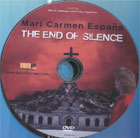
Mari Carmen España The End of Silence 2008
Distributed by The Video Project, PO Box 411376, San Francisco, CA 94141-1376; 800-475-2638
Produced by Martin Jönsson and Robert Danielsson
Directed by Martin Jönsson and Pontus Hjorthën
DVD, color, 59 min.
Sr. High - Adult
Sociology, Latin American Studies, Anthropology
Date Entered: 04/27/2010
Reviewed by Karen Coronado, George Fox University, Newberg, ORMari Carmen España is determined to break Spain's pact of silence, El Pacto de Silencio, surrounding the atrocities and murders committed during the reign of the fascist dictator, Francisco Franco. Her own grandfather lies buried in a mass grave that she has resolved to exhume in order to give him a proper burial. Martin Jönnson is a Swedish journalist who has a passion for Spain and for understanding the history of this dark time. He remembers the Prime Minister of Sweden speaking out against Franco's regime and vividly recalls participating in his first demonstration when he was just a boy. He travels to Spain and meets up with his boyhood friend to embark on a journey to aid Mari Carmen and to find answers to their questions. They visit an archive containing documented murders and travel throughout the country interviewing numerous primary and secondary witnesses including a former political prisoner, a former forced laborer, family members of victims, and political and religious leaders. All the while they remain in touch with Mari Carmen as they work to gain permission to open the graves and to hopefully bring some peace. Each unmarked mass grave lies in sharp contrast to that of the Spanish dictator. He is buried in honor near the largest memorial cross in the world at the Basilica of the Holy Cross of the Valley of the Fallen where his handpicked abbot still leads mass.
Martin and his friend Pontus obtain permission from the local government for excavation to begin at the site where Mari Carmen believes her grandfather is buried. This prompts other families to open mass grave sites all over Spain to search for and identify their murdered loved ones. What started as a small scale quest for answers, recognition, dignity and closure unleashes a new found wave of anger, pain, and grief for many. The people of Spain reveal that though they have been silent they have not forgotten.
Both sides have a story to tell and this documentary provides opportunities for the viewer to hear and see information and testimony from opposing viewpoints and differing perspectives. The narrative train of the film is well organized providing solid background information and historical context. Additionally, the road film genre provides an engaging and enjoyable viewing experience. Spanish, Swedish, and English are spoken and English subtitles are provided. No awards were listed for this film and that is a surprise—highly recommended!